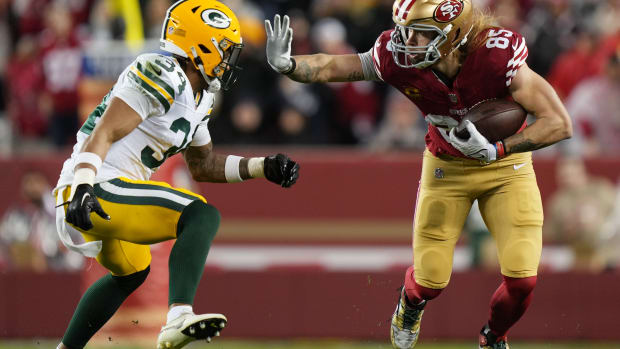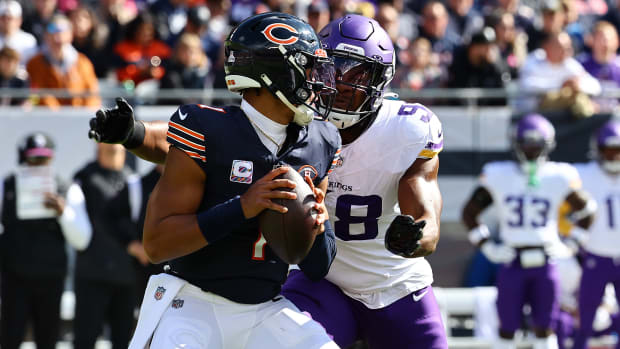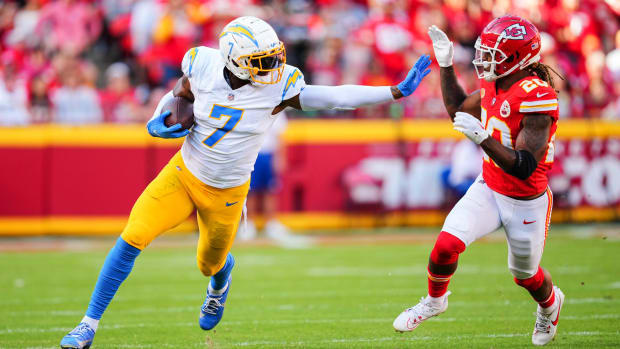A Slow Trickle, Not a Mass Exodus
Free agency rarely solves a team's long-term problems and can exacerbate existing ones.
The way to build teams has always been the draft. Free agency will only plug holes at best, or at worst overburden a team's salary cap with expensive, unproductive players—Robert Quinn, circa 2020.
Then there is the other aspect of free agency, which is simply losing players a team can no longer afford.
Any way it's sliced, the Bears are not going to emerge winners in the free agency period that starts Monday with the three-day legal tampering period.
By the time the signing period starts Wednesday at 3 p.m., or shortly thereafter, they are going to lose talent. It could start with defensive lineman Roy Robertson-Harris, who is expected to depart for another team.
A strong possibility exists they'll lose dangerous kick returner Cordarrelle Patterson because it's not easy to afford a $5.25 million return man who occasionally dabbles as a backup running back and averages 3.6 yards a carry.
It's not simply difficult to find someone of Patterson's talents at a low price, it's totally impossible. He's second all-time in kick return average and makes twice what almost all the other NFL kick returners made last year. So, the Bears would struggle to adequately replace what he brings to special teams.
They're already losers at offensive tackle with the decision not to pick up Bobby Massie's option for this year because the next three players on the depth chart behind him are also unrestricted free agents—Germain Ifedi, Jason Spriggs and Germain Ifedi. Will they sign any of them?
They could lose safety Tashaun Gipson, making it three straight years they've lost a starting safety in free agency. The marketplace and how much the Bears can free up in cap space could dictate whether they would give Gipson a deal for 2021.
None of those players mentioned could make or break the team.
If you haven't noticed, the Bears are probably losing their starting quarterback of the last four seasons, as well. Mitchell Trubisky will be signed by someone. ESPN analyst Matt Bowen calls Tennessee the ideal fit for Trubisky because of how well he played in an offense revamped at 2020 midseason to include many aspects of the attack the Titans use.
Regardless, four years is enough to know Trubisky has topped out nowhere near the desired level and they need to move on to find a quarterback at a cost they can't afford.
Therein lies the real danger for the Bears in this free agency period.
It's very likely they'll lose talent off the edges of the roster to teams looking for inexpensive, productive hands, but Saturday they may have saved some ability to avoid a complete exodus by restructuring contracts.
ESPN's Adam Schefter reported they had restructured the contracts of Khalil Mack, Cody Whitehair and Eddie Jackson to free up about $23 million in cap space.
Keep cutting.
The $23 million merely managed to get them under the cap enough to avoid being penalized. Spotrac.com had them at $23.5 million over on Saturday but this didn't include $5.4 million in savings by declining an option on Bobby Massie's deal or the $1.55 million in cap cost for punter Pat O'Donnell's deal.
It would appear they're just less than $4 million under the cap.
To achieve more space means either restructuring more contracts or offering extensions.
They can save more cash by getting extensions to cornerback Kyle Fuller and defensive lineman Akiem Hicks, although they could save the most by simply cutting both. It would save around $16.8 million and at the same time cost them two of their best defensive players.
Considering the large number of players entering the market from many teams trying to get under the cap, it's possible to find replacements for both in free agency for less money, but expecting to find comparable talent would be entirely presumptious.
Players who know the defensive scheme and have played at a Pro Bowl level are always difficult to find.
Normally they have managed to bring in a few free agents to plug up holes or provide depth. Whether they can even attempt to do it this year is uncertain. It's not impossible, though.
"I think that comes down to the number of players that we’ve evaluated and just being ready for every scenario and there’s a lot of hard work that’s gone on behind the scenes to allow us to maneuver through a really unprecedented offseason," Pace said.
All the cap cuts league-wide due to a lower cap already does mean a glut of talent available at cheaper prices. They may find some players willing to step in for cheaper deals for at least a year.
For instance, the Kansas City Chiefs just cut injured starting tackles Eric Fisher and Matt Schwartz, and if either could return to health by the regular season, they'd be able to help the Bears solve a real problem on their offensive line. The Packers have already cut tackle Rick Wagner and the Vikings tackle Reily Reiff, so there is a little depth building within free agency due to cuts, and it's happening at all positions.
"I think you’re going to see more of that around the league than you’ve ever seen," Pace said of such cuts. "But we’re prepared."
If they are really trading for Russell Wilson, the Bears need to have cash for this monstrosity of a contact or have his deal structured into digestible form. Taking on a quarterback of this talent and value requires a multitude of cap space.
Wilson would arrive and most likely players would then need to leave who take up big parts of the $182.5 million Bears cap. Players who are special contributors would leave either in the trade or simply due to the acquisition of cap debt.
Think Allen Robinson, Hicks or Fuller, or maybe Roquan Smith.
Whatever the case, Wilson or not, the Bears will come out of free agency with losses. They are in no position cap-wise to think otherwise.
It's just a matter of whether they can limit the loss and resulting decline.
Twitter: BearDigest@BearsOnMaven




